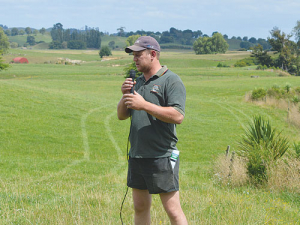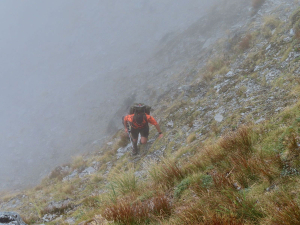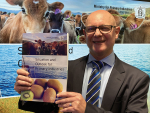They own a 123ha farm at Okoroire, near Tirau; 360 cows are milked and last year they produced 115,000kgMS.
Goldwater and Klippel hosted a field day on their farm last month, with DairyNZ, Farm Source and Waikato Regional Council on farm environment and riparian planning. About 70 farmers heard about the riparian planting the owners and their manager Bas Nelis are doing.
Klippel said that since buying the farm in 2007 they have retired 13ha for planting.
“Our vision is that we are not only farming for money; the environment is as important, not only for NZ but for generations.”
Since the farm hired Nelis the riparian planting has taken off, but “we still have a long way to go,” Klippel says.
Three gullies are featured and the Waihou River runs around the farm.
Nelis says restoration work in one of the gullies has finished; 16000 plants have gone in and weeds are sprayed annually. A digger was used to rip trees and logs out of the waterway before replanting. Work will start soon on a second gully.
Despite the low milk payout of the past few seasons, the farm owners went ahead with riparian planting.
“I’m extremely fortunate that the farm owners were willing to put money into the property; there’s a huge cost attached to this,” Nelis says.
The owners spent about $50,000 restoring one gully; regional councils have subsidised some of the riparian planting.
Farmers at the field day also looked at the farm’s environment plan (FEP), prepared free of charge by Farm Source, a Fonterra subsidiary.
The plan starts with a summary map showing key points of interest, for example, effluent pond, defined stock excluded waterways, shed location, compliant crossing and feed storage.
A summary table includes all open or ongoing actions the farmer has agreed to as part of the farm environment plan. They are organised in date order with the ‘risk rating’ of each feature.
The plan shows the risk rating for the farm effluent pond as medium; the pond has a clay lining and isn’t artificially lined as per Waikato Regional Council regulations.
The FEP recommends that to prove sealing standard compliance they need to have the pond tested by a company approved by WRC.
Effluent management has a low risk rating; effluent is capable of being spread to 29ha via a travelling irrigator complying with WRC’s nitrogen loading rules.
The risk of waterway contamination is low; stock are excluded from waterways by permanent fencing. The FEP says extensive riparian restoration has been done on most internal waterways.
“Tens of thousands of natives have been planted since the property was purchased; these riparian zones are well established and help filter sediment and nutrient from overland flow, provide bank stability and improve biodiversity.”
The risk of erosion is also low. Annual summer crops are grown on a small section of the farm. Soil tests are done every two years.
A Fonterra representative told the field day that a FEP is designed to improve waterways by monitoring nitrogen, phosphate, sediment and bacteria levels on farm.
What is a farm environment plan?
Farm environment plans are a key means of reducing the nitrogen, phosphorus, sediment and bacteria entering waterways.
Landowners will need to understand their current losses, identify how contaminants are lost from their farms and take action to reduce these losses.
Plans in Waikato Region will be due from 2020, depending on the priority of the catchment in which a farm is located. Plans may be developed under a certified industry scheme or a Waikato Regional Council resource consent, depending on individual circumstances.
All commercial vegetable growers and most farmers farming over 20ha will have to prepare a FEP.
Properties with small and low intensity farming or with low risk factors for water quality won’t need a FEP.
Fonterra is helping its farmers put together farm environment plans.
A Fonterra sustainable dairy advisor told the field day that with Waikato Regional Council’s proposed healthy rivers plan, all dairy farms will require a FEP.
He says if Fonterra waited till the WRC came out with its final rules on water quality, a lot of resource would be required to do FEPs for all its farmers.
So Farm Source is now helping farmers in Waikato draw up FEPs.
While Goldwater and Klippel’s farm is not included in Healthy River Plan Change 1, Farm Source has done a FEP.
“Basically it allows another set of eyes through your farm; we go through monitoring issues and give farmers tips on best practices.”
Fonterra believes it is highly likely other regional councils will move on water quality in the same way as WRC, so FEPs are likely to be required in other regions.
















